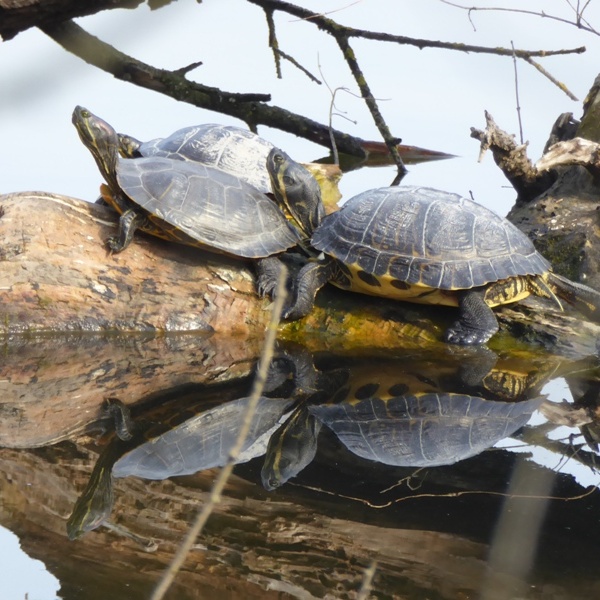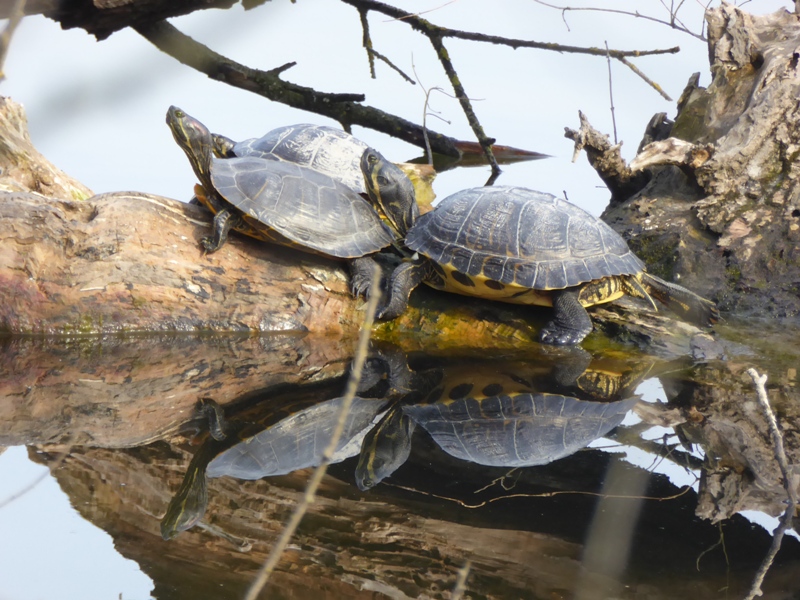A study on the zoonoses of aquatic turtles
June 26, 2025
Some individuals of Trachemys scripta sunbathe in the Avigliana Lakes. - Arch. Parchi Alpi Cozie
The American pond turtles present in the Lake Grande di Avigliana carry infectious diseases that can be transmitted to humans. This is what emerges from a scientific study conducted by the Experimental Zooprophylactic Institute of Piedmont, Liguria, and Aosta Valley in the Avigliana Lakes Natural Park and published in the international journal "Veterinary medicine and science." It turns out that 13.3% of individuals are infected with Salmonellosis or Cryptosporidium.
Premise
The research took place in 2021 and 2022 at the Lake Grande di Avigliana during a study activity on the Louisiana red crayfish (Procambarus clarkii) during which 83 turtle individuals were found in traps. Taking advantage of the opportunity offered by these unexpected captures, the technicians from IZSPLV decided to initiate a new line of analysis.
Procedure
The turtles were censored, determining their subspecies and classifying them by age, weight, size, and sex. Their fecal material was collected for laboratory analyses aimed at identifying 3 pathogens: Salmonella, Leptospira, and Cryptosporidium. Finally, they underwent necroscopy.
The results
Overall, 11 turtles (13.3% of the sample) were found positive for one of the zoonoses, with 10 cases of Salmonella, 1 of Cryptosporidium, and none of Leptospira. The pathogens presented with higher prevalence in females than in males, with no particular associations with age. Of the 83 turtles analyzed, 65 belonged to the subspecies Trachemys scripta scripta, in which all 10 positives for Salmonella were manifested, while 18 belonged to the subspecies Trachemys scripta elegans, which revealed the only positivity for Cryptosporidium. It is highly likely that the individuals were healthy carriers of the pathogens because none of them showed traces of intestinal lesions during necroscopy.
The conclusions
The health monitoring of American pond turtles proves to be extremely important in those basins, like the Lake Grande di Avigliana, where turtles are significantly present and where human recreational activities in water take place, as there may be cases of transmission of pathogens from animal populations to humans.
An invasive species
It should be emphasized that Trachemys represents an alien species in our country as they are native to the American continent from which they were imported between the late '80s and early '90s as pets. However, they soon began to be abandoned in natural environments where they proliferated often uncontrollably, thanks to their high adaptability, displacing local native species and causing a general distortion of ecological balances. Their importation has been prohibited by European legislation since 1997, while in Italy they were classified as an invasive alien species in 2017.
You might also be interested in...
- campaign The second newsletter of the Life Predator
- campaign Biodiversity at risk: the Emys orbicularis
- campaign Professional fishing for catfish is starting.
- campaign Withdrawals and removal of catfish in the Avigliana Lakes: the 2025 report
- tactic Amphibians
- campaign In search of the lost ice on the Lakes of Avigliana
- campaign Lakes of Avigliana: closure of the walkway
- campaign SOS Amphibians 2025: a report
- campaign Giornata mondiale dell'ambiente: il Miriophyllum spicatum nel Lago Grande di Avigliana
- campaign Presenza di schiume algali sul Lago Grande di Avigliana
 Research
Research
